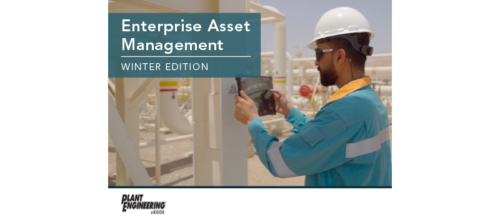Company assets: employees top list
EDITOR'S NOTE: This column is the sixth in a series of columns based on the book, Future Capable Company: What Manufacturing Leaders Need To Do Today To Succeed Tomorrow, by Dr. Tompkins. These excerpts are provided through special arrangement with the publisher, Tompkins Press. Copyright © 2001 Tompkins Press.
Future Capable Companies must view employees as their most important assets, because without their commitment, continuous improvement will not happen. Organizations must value intellectual capital and secure their growth by making sure all employees are satisfied, happy, and challenged.
“Employees are a company’s most valuable asset.” How often does that appear in company memos or framed prints in an organization’s hallway? Although it may seem it’s said so often that it has lost its value, in reality it’s not said enough. It is a philosophy that tends to be lost among profit and loss margins, and it should not be.
When a company begins viewing its employees as assets, then that company can begin to maximize their participation in its operations and its successes. An effective means of maximizing their participation is to realize the value of their intellectual capital. Knowledge is such a prized commodity in today’s marketplace that many workers are now being called “knowledge workers.” Companies that use this capital to their advantage, while also making sure that their employees have been provided with the tools they need to grow and succeed, are Future Capable Companies.
Future Capable Companies view employees as their most important assets, knowing that without them, continuous improvement will not be achieved. Therefore, they invest in their employees.
Future Capable Leadership
Energetic, passionate, intense, and determined people characterize Future Capable Companies. Therefore, they need leaders who are even more energetic, passionate, intense, and determined than they are. They need Future Capable Leaders.
Future Capable Leaders have these qualities:
Integrity—Future Capable Leaders live and tell the truth, deal with people and situations in a straightforward, sincere fashion, and behave ethically.
Credibility—Future Capable Leaders are accountable, genuine, and open.
Enthusiasm—Future Capable Leaders show their excitement about the future, because such excitement is contagious.
Optimism—Future Capable Leaders are confident about what they are doing to focus on success.
Urgency—GO, GO, GO! Future Capable Leaders know that the only way to affect the future is to act now. They do not spend a great deal of time savoring their successes, because they are already focusing on the future.
Determination—Future Capable Leaders step forward to face doubts and uncertainties, to accept risk, to move forward, and to make real their understanding that there are no boundaries between their organizations and gaining competitive advantage.
Relying on these characteristics, Future Capable Leaders motivate others by the way they communicate, work, and treat others. Future Capable Leaders recognize the importance of effective communication, and they arm people with certainty and control through direct communication and sharing information. They seek out other Future Capable Leaders in their supply chain partnerships and share skills and knowledge. Future Capable Leaders motivate others by the way they work, because they adhere to personal work policies that result in working hard and smart. These policies are:
Make the right decision, adhering to the “three rights.” The right decisions at the right time communicated to the right people.
Focus on process management, not time management, and prepare for interruptions. Interruptions can provide a much-needed picture of what may really be happening with a project or projects.
Pay attention to the right details. Delegate those details that are not relevant to the decision at hand to others who are capable of handling them.
Go the extra mile by exceeding all expectations, particularly in the areas of friendliness, responsiveness, and attentiveness. Finally, Future Capable Leaders treat others in the way others want to be treated.
Realize that change is inevitable and accept, anticipate, and harness it, while realizing that mistakes are not only possible, they are inevitable, and must be admitted.
Future Capable Leaders treat people in the way those people want to be treated. They offer compassion, politeness, trust, dignity, respect, and fairness. In doing so, they motivate people, because people who are treated as they wish to be treated are more likely to offer the same courtesies to others.
Through their actions, Future Capable Leaders foster the environment necessary for investing in the human capital required to create a Future Capable Company. They are aware of how important employees are and how much value they add to an organization. They lead and participate in the cultural revolution that creates the Future Capable Company.
Development
A development program that will maintain Future Capable employees, and thus result in a Future Capable Company, must first address the development needed. All employees need three types of development: visionary development, general development, and specific development.
Visionary development is the basic foundation upon which happy and motivated employees evolve. Visionary development is the consistency portion of dynamic consistency.
All employees involved in a supply chain, from CEOs to operations managers to document technicians, must understand the processes that create Future Capable Companies or there will be no shared beliefs and no Future Capable Employees or Future Capable Leaders. Therefore, the most important developmental need of every organization is for everyone in the company to understand the concept of the Future Capable Company.
Fulfilling this visionary development need will be a major step toward becoming a Future Capable Company.
General knowledge development
General developmental needs are categorized as general knowledge development and general skills development. General knowledge development includes an understanding of the following:
How a company is organized
The technology involved
How products are used
Who uses the products
The company supply chain’s competition
The company’s strengths, weaknesses, opportunities, and challenges.
General skill development General skill development is learning skills that are needed to best contribute to a company’s success. They include the following:
Problem solving
Planning
Cost reduction
Quality enhancement
Communications
Managing
Goal setting
Creativity
Information technology and computer literacy.
The challenge of general development is in determining who would benefit from which type. Typically, managers underestimate the value of having their employees exposed to general development. As a guideline, any developmental program of interest to a manager is probably also of interest to the manager’s staff. Keep in mind that greater understanding leads to motivation and happiness.
Specific developmental needs are programs designed for special groups of individuals. For example, network administrators will require a specific program when a new system is installed; maintenance will require one when a new machine is installed; marketing and sales will require a specific developmental program when a new product is introduced.
Avoid overly restricting the participants in the specific developmental activities. Developing employees beyond their present position will provide the benefits of multiskilling.
Address how to achieve the development needed. The basic approach to developing is to uncover, discover, and recover. The first step, uncover, means that the need must be uncovered in the mind of the person being developed. This person must believe there is a purpose in developing new knowledge or skills. Next, there must be a discovery on the part of the participant of the new knowledge or skill.
The person being developed must be immersed to the point where the brain comprehends the new knowledge or skill. Lastly, during recovery, the knowledge or skill is put into practice. Only by experimenting with the knowledge or skill is the development successful. Without recovery, there is no application of the knowledge or skill, and thus, no true development.
Trust
Hiring a Future Capable Employee and providing for the person’s development is not enough to keep him or her motivated and happy. There must also be trust. Without trust:
There are no motivated and happy employees.
There is no respect, and thus, no loyalty.
There is no participation and no success.
There is no Future Capable Company.
When trust exists, employees and managers respect each other. From respect comes a sincere desire to listen, which results in an understanding of the other’s perspective.
How to Maximize Human Capital
Maximizing human capital requires a long-term, consistent effort. It also includes:
A lasting commitment to employees
The confidence of all employees in this commitment
The development of all employees
A mutual trust among all employees
The cooperation and teamwork of all employees.
Author Information
Dr. James A. Tompkins is the president and founder of Tompkins Associates, a leading global consulting, implementation, and integration firm focused on total operations success. Future Capable Company is available from Tompkins Press, 2809 Millbrook Rd., Raleigh, NC 27604. Phone 800-789-1257, fax 919-872-9666,
Do you have experience and expertise with the topics mentioned in this content? You should consider contributing to our CFE Media editorial team and getting the recognition you and your company deserve. Click here to start this process.



